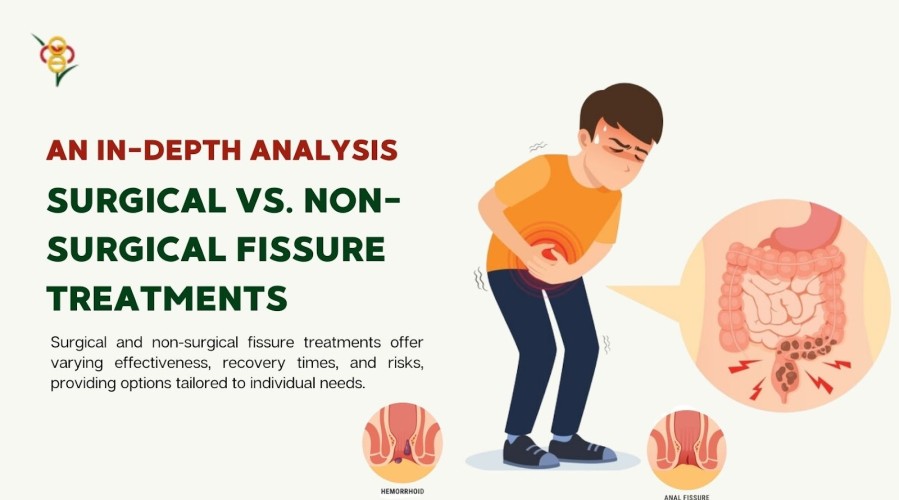Learn effective solutions for digestive problems with expert tips to improve gut health, reduce discomfort, and maintain a healthy digestive system.
Surgical vs. Non-Surgical Fissure Treatments: An In-depth Analysis

Surgical vs. Non-Surgical Fissure Treatments: An In-depth Analysis
Anal fissures, small tears in the lining of the anus, can cause significant discomfort. Addressing this issue requires understanding the treatment options available. This blog provides an in-depth comparison between surgical and non-surgical fissure treatments, helping you make an informed decision.
Understanding Anal Fissures
Anal fissures are small tears in the mucosal lining of the anus, typically caused by passing hard or large stools. They can lead to pain, bleeding, and discomfort during bowel movements. Knowing the available treatments is essential for managing this condition effectively.
Non-Surgical Treatments
Non-surgical treatments are often the first line of defense against anal fissures. They focus on reducing symptoms and promoting healing without invasive procedures.
1. Dietary Changes
- Increase Fiber Intake: A diet rich in fiber helps soften stools, making them easier to pass and reducing strain on the anal area.
- Hydration: Drinking plenty of water keeps stools soft and promotes regular bowel movements.
- Avoid Spicy Foods: Spicy foods can irritate the digestive tract and exacerbate symptoms.
2. Topical Treatments
- Nitroglycerin Ointment: This ointment helps relax the anal sphincter, reducing pain and promoting healing.
- Calcium Channel Blockers: These medications can also help relax the anal sphincter and improve blood flow to the area.
3. Sitz Baths
- Warm Water Soaks: Sitting in warm water for 10-15 minutes several times a day can soothe the anal area and promote healing.
- Epsom Salt: Adding Epsom salt to the bath can further reduce inflammation and discomfort.
4. Over-the-Counter Pain Relief
- Analgesics: Over-the-counter pain relievers like ibuprofen or acetaminophen can help manage pain associated with anal fissures.
- Stool Softeners: These can make bowel movements less painful by softening the stool.
Surgical Treatments
When non-surgical methods are ineffective, surgical options may be considered. These procedures are more invasive but often provide long-term relief.
1. Lateral Internal Sphincterotomy
- Procedure: This surgery involves making a small cut in the anal sphincter muscle to reduce tension, allowing the fissure to heal.
- Recovery: Patients usually experience significant pain relief and healing within a few weeks.
- Risks: As with any surgery, there are risks of infection, bleeding, and potential changes in bowel control.
2. Fissurectomy
- Procedure: This involves the removal of the fissure and any underlying scar tissue, promoting faster healing.
- Recovery: Healing times can vary, and proper post-operative care is crucial.
- Risks: Similar to other surgical procedures, there are risks of infection and bleeding.
3. Botulinum Toxin (Botox) Injections
- Procedure: Botox is injected into the anal sphincter to temporarily paralyze the muscle, reducing spasms and allowing the fissure to heal.
- Recovery: The effects of Botox last for a few months, during which the fissure can heal.
- Risks: Potential side effects include temporary incontinence and allergic reactions.
Comparing Surgical and Non-Surgical Treatments
Effectiveness: Surgical treatments tend to be more effective in chronic cases, while non-surgical treatments are ideal for acute fissures.
Recovery Time: Non-surgical treatments generally have shorter recovery times compared to surgical procedures.
Risks: Surgical treatments carry higher risks but can provide a permanent solution, while non-surgical methods are less invasive but may require ongoing management.
Cost: Surgical treatments are often more expensive due to the need for specialized procedures and hospital stays.
Schedule an Appointment
If you are experiencing symptoms of anal fissures and need expert advice, schedule an appointment with GEM Hospital. Our experienced team offers both surgical and non-surgical treatments tailored to your needs, ensuring comprehensive care for your condition. Contact us today to start your journey toward relief and recovery.
Blogs & Article
Explore current research trends in digestive health, including new treatments, advanced diagnostics, and innovations improving gut health and patient care.
Discover common digestive health myths and the real facts. Learn simple tips to improve gut health and maintain better digestion for a healthier life.


